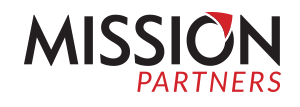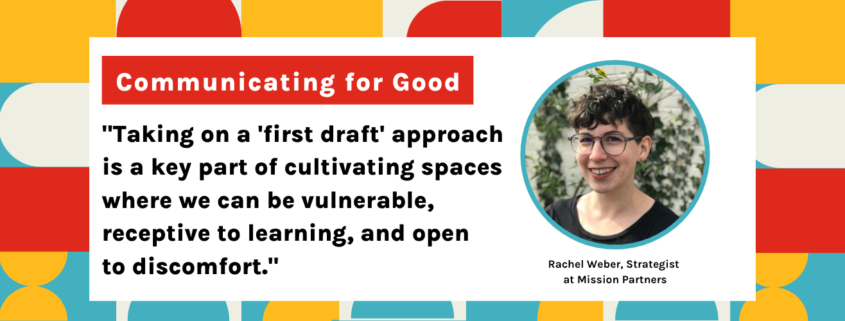First Draft Thoughts Welcome
It’s two hours after a meeting and the words finally arrange themselves in your mind. You were quiet during the discussion—not for lack of ideas but for worry of getting the words wrong. Ah, that’s what I should have said. Sound familiar?
Whether it is fear of being revealed as an “imposter” or navigating entrenched power dynamics in the workplace, there are real barriers to participation that take intentional systems, big and small, to disrupt. That’s why at Mission Partners, we say that “first draft thoughts” are welcome.
“First draft thoughts” are one of several grounding commitments we have at Mission Partners, which are mutually agreed upon for the purposes of creating safe, inclusive, and generative meeting spaces. It’s a homegrown list, with some terms created or adapted by our team and others crowdsourced from clients and partners.
I carried the term “first draft thoughts” from my previous work in climate justice organizing, where experimentation and problem solving were part and parcel to building a stronger movement for justice. It was a phrase I’d literally say aloud to signal that my next words might not have the shine of a finished product. It’s a reminder to myself—and an invitation to others—that ideating and co-creating are often rough around the edges. And at Mission Partners, where “Continuous Learning and Growth” and “People First” are two of five company values that underpin all we do, “first draft thoughts” are a recognition of the active, messy, and truly human process of discovery and understanding.
The Payoffs of a First Draft Approach
Engaged, curious teams are usually ones where mistakes are welcome and participation from all is encouraged. In cultivating a culture of participation and curiosity, it’s not just our meetings that are strengthened—it’s all that comes out of them.
Sharing our first drafts opens them up to be validated, challenged, added onto, and stress-tested. Any writer, editor, or English teacher will tell you that you can’t skip out on revisions to your essay or article. So too it is with ideas: it’s through collaboration and experimentation that we end up with the most excellent outcome.
If the goal of a brainstorm is to address a hard-to-solve problem, we need to invite all solution-finders, question-askers, and hole-pokers into the room—and at the same time recognize how, when, and why we aren’t hearing from those closest to the issues at hand. Welcoming “first draft thoughts” is one way to break those patterns of exclusion. We can only create authentic, accessible, and equitable messaging and programs by deep listening and meaningful inclusion of diverse, representative voices—especially those whose perspectives (first draft or otherwise) have historically been marginalized.
Why We Need to Get Uncomfortable
You’ll hear “first draft thoughts…” quipped at a lot of meetings at Mission Partners, but critically, a first draft approach is vital to our commitment to advance racial equity within our business, our client work, and our world. At its heart, it’s about practicing getting uncomfortable.
Our team members, clients, and partners are all at different points along the lifelong process of dismantling white supremacy culture and advancing racial equity. Taking on a “first draft” approach is a key part of cultivating spaces where we can be vulnerable, receptive to learning, and open to discomfort.
For some, especially for white people, this kind of discussion might be one of the first times gathering in a group to talk about race. I’ve heard from colleagues and friends that the fear of getting the words wrong can feel like an insurmountable barrier to engage meaningfully in conversations, and action, on dismantling racism. I’ve certainly held this idea within myself, as well.
This was a frequently-shared reflection, for example, when in 2021 I participated in a workshop called “White Women Taking On Our Own White Supremacy.” But, as we discussed the history of violence wrapped up in the silence of white women, there’s a lot more to be lost by remaining quiet than there is by speaking up. The workshop was organized by We Are Finding Freedom, which calls itself a “community coming together to take bigger risks for racial justice.” Sharing a “first draft thought” might be the first step to taking a small risk, and then bigger risks, in pursuit of justice.
A Quick Revision
I would be remiss not to name an important caveat or two. Importantly, “first draft thoughts” are not meant to be workplace shorthand for “no offense, but.” Yes, our words need not be perfect, but we still must hold ourselves accountable for the impact they have—and indeed, our words can cause harm. So we always must engage mindfully, listen, and receive and integrate feedback about how our first drafts are read by others.
On top of that, your version of “first draft thinking” might not look or sound the same as mine. People process information in different ways, and we all have a role in ensuring that there are multiple entry points for engagement—that team members, partners, and stakeholders have opportunities to share feedback and ideas beyond just coming off mute in the moment.
We miss out on vital perspectives if our collaboration defaults to dominant voices, which is why our team is also guided by gathering commitments like “take space, make space, and share the air”—a challenge to take space if you tend to be quieter, and to make space if you find yourself talking a lot (even with a lot of “first draft thoughts!”).
Get Drafting
Whether you’re a participant or facilitator, I invite you to see how a “first draft” approach impacts your next team brainstorm. Before kicking off the discussion, make it clear that contributions don’t need to be polished or even fully baked—first draft thoughts are welcome. And if you have an idea, or a curiosity, or a challenge, but are worried about getting the words just right, invite grace by signaling that “these are first draft thoughts.” My hope is that it can help unlock creativity, curiosity, risk-taking, and play even a small role in the big work of moving your mission forward.
The spark might be in the stumble. Progress is certainly through practice. And we need a whole lot of first drafts to write a story that works for all of us.





 Check out our new
Check out our new